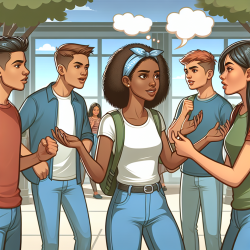Introduction
Understanding the dynamics of bullying and the roles peers play in defending or bystanding is crucial for developing effective interventions. The research article "Socio-Cognitive Processes and Peer-Network Influences in Defending and Bystanding" offers valuable insights into these dynamics, particularly the influence of peer networks on defending and bystanding behaviors and the associated socio-cognitive processes.
Key Findings
The study involved 1,354 adolescents from northern Italy, employing a longitudinal social network analytic approach. Key findings include:
- Adolescents tend to adopt similar defending and bystanding behaviors as their friends, influenced by peer networks.
- Defending behaviors are associated with higher self-efficacy, while bystanding correlates with moral distress.
- Friend networks play a significant role in shaping these socio-cognitive processes, with adolescents more likely to mirror their friends' behaviors and perceptions over time.
Implications for Practitioners
Practitioners working with adolescents can leverage these findings to improve outcomes in bullying interventions. Here are some strategies:
- Enhance Peer Influence: Encourage positive peer interactions and friendships that promote defending behaviors. Create environments where defending is seen as a norm.
- Focus on Self-Efficacy: Develop programs that boost students' confidence in their ability to intervene in bullying situations. Role-playing and peer-led workshops can be effective.
- Address Moral Distress: Help students process their emotions and understand the impact of their actions or inactions. Providing support systems for students who experience moral distress can mitigate negative outcomes.
Encouraging Further Research
While this study provides a foundational understanding, further research is needed to explore the mechanisms of peer influence in greater detail. Practitioners are encouraged to contribute to this growing field by conducting their own studies or collaborating with researchers to refine intervention strategies.
To read the original research paper, please follow this link: Socio-Cognitive Processes and Peer-Network Influences in Defending and Bystanding.










